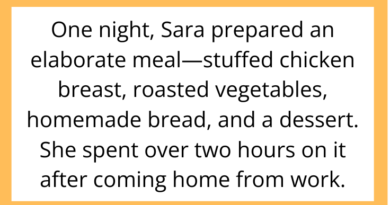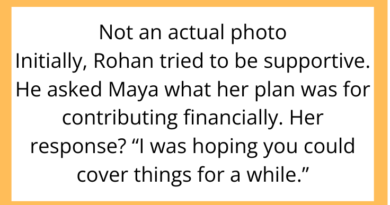AITAH for Telling My Best Friend She’s Ruining Her Marriage by Oversharing Online?
When you think of oversharing on social media, you probably picture vague complaints or endless selfies. But what happens when your best friend starts airing every detail of her marriage—fights, insecurities, and private moments—for thousands of followers? In today’s AITAH scenario, we’re diving into a story that has sparked heated debates: Is it ever okay to call someone out for oversharing, or does that cross the line into judgment?
The Story: A Friendship Tested by the Internet

Our storyteller—let’s call her Mia—is a 31-year-old woman who has been best friends with Zoe since college. Zoe, 32, married her husband four years ago. According to Mia, Zoe has always been an open book, but over the past year, her social media habits have escalated.
Zoe runs a popular lifestyle account where she posts everything from skincare routines to relationship advice. Recently, she’s started sharing long captions about her arguments with her husband, the ups and downs of their intimacy, and private conversations they’ve had about starting a family.
Mia began to feel uncomfortable. She noticed mutual friends gossiping about Zoe’s marriage, and even strangers in the comments weighing in with harsh opinions. Mia worried that Zoe was damaging her own relationship by turning every conflict into content.
The Intervention: Mia Speaks Up

After months of feeling uneasy, Mia finally decided to say something. Over brunch, she gently told Zoe that she might be oversharing and suggested she consider keeping some aspects of her marriage private.
“I just think it’s not healthy to put every detail out there,” Mia said. “It’s opening you up to judgment and maybe even hurting your relationship.”
Zoe was immediately defensive. She said Mia was being condescending and unsupportive. According to Zoe, she was helping people by being honest about her struggles, and Mia’s concerns were just another example of someone trying to silence her.
Their brunch ended awkwardly, and Zoe hasn’t called Mia since.
Mia turned to Reddit’s AITAH community: Am I the villain for telling my best friend she’s oversharing?
Why This Situation Hits Home

This story resonates because it touches on two powerful forces: friendship and social media. In a world where sharing online feels normal—even necessary—it can be hard to know where the line is between openness and oversharing.
Let’s explore both sides.
The Case for Mia: Protecting Privacy and Friendship
Mia’s intention wasn’t to shame Zoe, but to protect her. Oversharing private issues can:
-
Invite judgment and criticism that makes problems worse.
-
Undermine trust between spouses.
-
Create a permanent digital record of moments that were never meant for public consumption.
It’s easy to see why Mia felt compelled to say something. As a best friend, she probably felt responsible for offering a reality check.
The Case for Zoe: Authenticity as a Calling
Zoe sees her platform as a space for authenticity. In her eyes, sharing the good, bad, and ugly helps normalize the fact that marriage isn’t perfect.
She also likely feels that if her husband is okay with her posts (or has at least accepted them), Mia has no right to interfere.
To Zoe, Mia’s comments probably felt patronizing and judgmental, especially since Mia doesn’t have a large online following herself.
What Reddit Thinks: The Community Weighs In

The AITAH subreddit delivered its verdict in thousands of upvotes and comments. Most users felt Mia was not the villain.
“You didn’t tell her to stop posting—you expressed concern as a friend,” one commenter wrote. “That’s what good friends do.”
Others pointed out that Zoe’s marriage could face real damage if every argument becomes public debate. Some users shared personal stories about how oversharing destroyed their own relationships.
However, a smaller group of commenters sided with Zoe, arguing that Mia should have stayed out of it.
“Unless her husband complained to you, it’s really none of your business,” one user said. “You sound a little judgmental.”
The Bigger Picture: Social Media and Boundaries

This story underscores a growing challenge in the digital age: the blurred line between authenticity and privacy.
When does sharing stop being empowering and start being harmful?
Some questions worth asking:
-
Does posting this help others, or just vent your own frustrations?
-
Would you feel comfortable if your partner shared the same details about you?
-
Could this post be used against you later?
For Zoe, these are questions she may eventually have to answer.
Tips for Handling Oversharing in Friendships

If you ever find yourself in Mia’s position, consider these steps:
1. Be gentle. Frame your concerns as caring, not critical.
2. Use “I” statements. Instead of “You’re ruining your marriage,” try “I worry this could hurt your relationship.”
3. Respect autonomy. Once you’ve voiced your thoughts, step back. Ultimately, it’s your friend’s decision.
4. Focus on support. If your friend chooses to keep sharing, be there for them—even if you disagree.
You’re Not Always the Villain for Speaking the Truth

At the end of the day, Mia’s story is a reminder that sometimes, caring means having uncomfortable conversations. Telling someone you’re worried doesn’t automatically make you a villain—it might just make you a true friend.
But as with everything online, context matters. And sometimes, people won’t appreciate your honesty.



